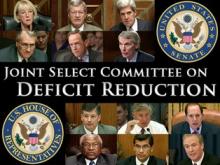Super Committee Members Create Powerful Target for Special Interests
Super Committee Members Create Powerful Target for Special Interests
The inherent problem of the Joint Committee's mandate is that whatever agreement they reach will go straight to the President's desk, veto-proof and undeniable. They're tasked with cutting $1.5 trillion from the federal budget over 10 years, though they've been pressed to cut much more, as much as $4 trillion. They will almost certainly reach some kind of agreement, because if they don't then, written into the law, there will massive budget cuts across both entitlements and defense. However, the fact that the bill will bypass congress is partly a political necessity given the entrenchment of congressional lawmakers, but removes any checks or balances from the power of the Joint Committee. Placing this much power in so relatively few representatives and senators creates a political bottleneck that spells opportunity for special interests. Lobbies have already designated millions of dollars from corporations and other special interests aimed at these twelve lawmakers with the hope of pressing their influence into one of the biggest-ticket bills the nation has seen in eighty years.
John Kerry (D-MA), so far, is the only Joint Committee member to announce that he will not be holding any fundraising events during his tenure on the committee. This flies in he face of the Herculean lobbying effort mounting around them. Kerry told the Boston Globe that he would, "not be raising any money while the committee worked," through November 23rd. Sen. Max Baucus (D-Mont.), has canceled at least one event and hinted that he may cancel future fundraisers as well. On the other hand, other members seem to be pressing their unique position within the committee. Jim Clyburn (D-SC), reportedly has six fundraising events scheduled for just this coming week; four for his own campaign coming up in 2012 and two for his PAC, Bridge PAC. These fundraising events are not necessarily indicators of the representative being "open for business", as donations can come to anyone's campaign at any time. However, it does show a certain disregard for the public perception that they're selling their votes. Other concerns raised were over Sen. Patty Murray (D-WA), who heads the Democratic Senatorial Campaign Committee, and may be given a fundraising edge by dint of her position on the Joint Committee. Among Republicans, every member of the Joint Committee is continuing with fundraising events during between now and the Thanksgiving deadline.
A far more effective way of tracing the money trail would be a temporary watchdog mandate for disclosure of members' donors and amounts of donations. Since donations can be made at any point, and since the life of this Joint Committee is so short, it makes since to provide temporary transparency to such a small group of people that collectively have more power than anyone else in Washington right now. Lobbies have certainly recognized that, and for us to simply standby and say, "rules are rules", or, "this is just the way it goes", would be irresponsible. I'd like to see a '.gov' sometime in the next few weeks that mandates disclosure of all donors and donations to this select group of people until the deal is reached.



